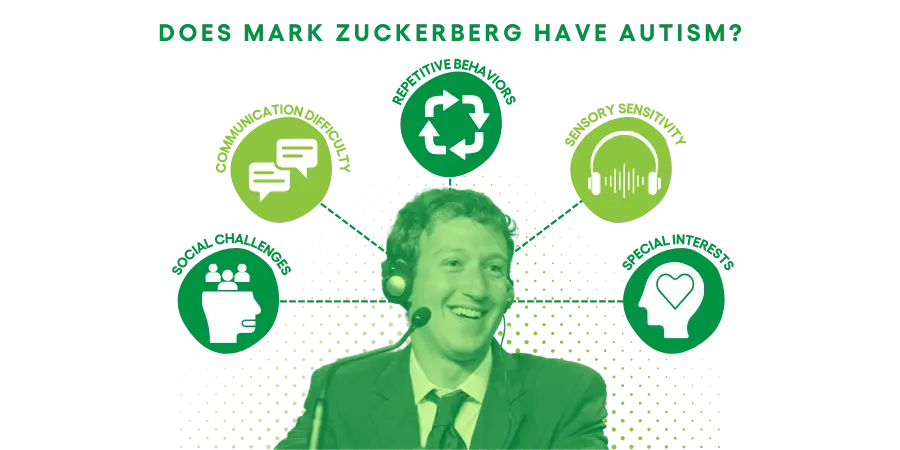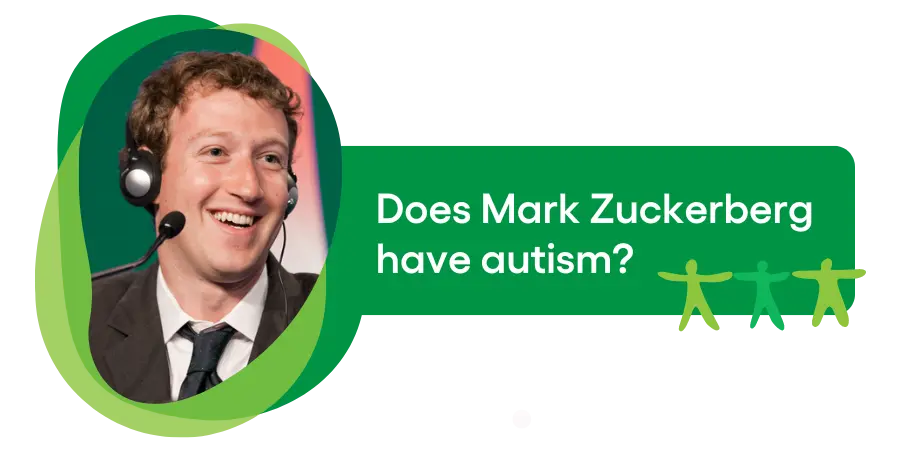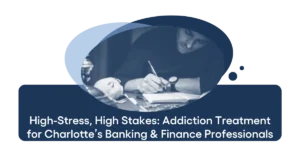Yes. Mark Zuckerberg confirmed having Asperger’s syndrome in a 2013 public statement, which is a diagnosis within the autism spectrum.
Mark Zuckerberg is a common household name—and it is likely that he has influenced your life, even if you don’t realize it. Born in 1984, he is one of the youngest self-made billionaires in the world. He is best known for Facebook, which he created from his dorm room at Harvard University.
The question has come up before – does Mark Zuckerberg have autism? The question of autism in other self-made billionaires has been brought up in the past, with Elon Musk recently confirming a diagnosis of Asperger’s syndrome. Mark Zuckerberg confirmed having Asperger’s syndrome in a 2013 public statement, which is a diagnosis within the autism spectrum.

What is Autism Spectrum Disorder?
Autism spectrum disorder (ASD) is a neurological and developmental disorder that is characterized by persistent challenges with social communication, restricted interests, and repetitive behavior. It is considered a lifelong disorder, but the degree of impairment varies among individuals.
The Centers for Disease Control and Prevention (CDC) estimates that one in 36 children has ASD.
The Different Types of Autism
ASD does not just include one specific diagnosis – it is a spectrum – a wide range of criteria that encompass a generalized set of symptoms that define the disorder. Even though this spectrum has a multitude of symptoms and names, some of the most diagnosed ASD disorders include:
- Kanner’s Syndrome (Autism): Kanner’s Syndrome is an outdated term used to describe what doctors diagnose as generalized autism. Named for Leo Kanner, one of the researchers who wrote the original report on autism in 1943, it includes the common symptoms associated with the disorder, like socialization impairments and repetitive behaviors.
Asperger’s Syndrome: Previously diagnosed outside the autism spectrum, Asperger’s syndrome is a developmental disorder that shares several symptoms with autism – but also has its own set of criteria. Asperger’s does not require an onset before the age of 3, does not require a language delay, but does require a deficit in cognitive development.
- Childhood Disintegrative Disorder (CDD): CDD is another developmental disorder under the autism umbrella and is a more severe form of autism. CDD is rare and has a prevalence of 1.7 in 100,000 children. The rate of epilepsy is higher in children with CDD, and children may present with more fearfulness than children with other autism disorders.
- Pervasive Development Disorder Not Otherwise Specified (PDD-NOS): One of the original three types of autism and was originally used as a “catch-all” diagnosis for anyone who didn’t meet the set criteria for autism. Common symptoms include problems with communicating, difficulty with social interactions, unusual play, and more.
Common Symptoms of ASD
Before getting into the specifics of Mark Zuckerberg, autism diagnoses require a specific set of criteria to be met. To receive a proper autism diagnosis, an evaluation must be completed. The evaluation follows the Diagnostic and Statistical Manual (DSM-V), which lays out the specific symptoms and criteria to classify someone as having an autism spectrum disorder.
Individuals with ASD often display a wide range of abilities and strengths, and not all symptoms may be present in every person with the disorder.
Some of the most common characteristics include:
- Social Challenges: Difficulty with social interaction, such as understanding social cues, maintaining eye contact, and engaging in reciprocal conversation.
- Communication Difficulties: Delayed or impaired speech and language development, difficulty understanding and using nonverbal communication, such as gestures or facial expressions.
- Repetitive Behaviors: Engaging in repetitive movements or actions, such as hand-flapping, rocking, or repeating words or phrases (echolalia).
- Restricted Interests: Developing intense interests in specific topics or objects, often to the exclusion of other activities or subjects.
- Sensory Sensitivities: Heightened sensitivity or aversion to sensory stimuli, such as loud noises, bright lights, certain textures, or specific smells.
- Difficulty with Changes in Routine: Resistance to change or disruptions in routines, and difficulty adapting to new situations or environments.

Mark Zuckerberg’s Autistic Traits
When it comes to Mark Zuckerberg, autism comes in the form of Asperger’s syndrome. Asperger’s is a mild form of autism – so diagnosing it can prove difficult. Like other autism disorders, the range of severity can vary from mild to extremely severe. In some cases, you may not even know that someone has Asperger’s – like Mark Zuckerberg.
There has been a lot of back and forth in the media over the last couple of decades – does Mark Zuckerberg have autism? Just do a search on the internet, and you will find conflicting diagnoses and hypotheticals from just about everyone – but in a public statement in 2013, Mark confirmed that he does have a form of autism, Asperger’s syndrome.
Even though he is highly intelligent and successful, Mark has been described as having a keen attention to detail and an ability to focus intensely on complex problems. These traits are often associated with autism.
Bottom Line: Does Mark Zuckerberg Have Autism?
Technically, Mark Zuckerberg has not presented the world with a clinical diagnosis pointing to autism – what he and his doctors discuss is between them. His public statement in 2013 and his character traits do support the possibility of his having Asperger’s syndrome – but we cannot say definitively that this is true.
Autism is a complex disorder that requires specific evaluations by professionals to make a diagnosis. If you believe that you or a loved one may have ASD, it is important for you to reach out to a healthcare provider to discuss the symptoms being experienced.










